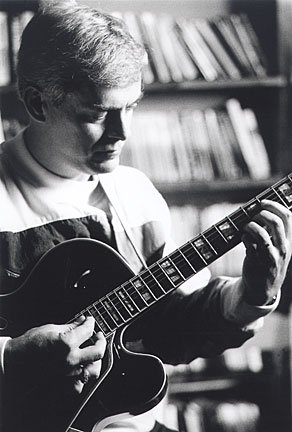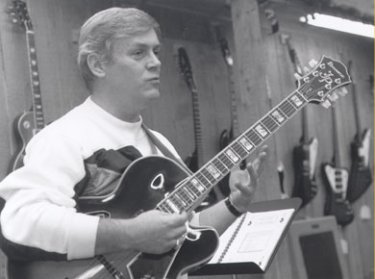
|
Bob Roetker |
Bio
Guitarist
Arranger
Conductor
Listen
Gallery
Fun Stuff
Contact
Originally published in the July, 1996 issue of the newsletter of the Cincinnati Jazz Guitar Society.
Bob Roetker does not look, talk, or act like anyone's stereotype of a jazz musician, but he certainly plays like one. It's a testimony to the quality of jazz musicians in Cincinnati that a player as strong as Bob is not better known than he is. His playing is marked by strong technique, intricate bop lines and a very tight rhythmic feel.
 |
|
Bob Roetker |
Roetker, 48, is a Cincinnati native, but left Cincinnati in his early 20's to be a musician in uniform. He returned to the Queen City after his 20 year career as a guitarist and guitar instructor in the Army ended in 1990.
Bob was originally not a guitarist, but a drummer. He actually did not begin playing guitar until after he graduated high school, and his first gigs were on drums.
TB: Tell me the "Bob Roetker Story." How did you get started playing?
BR: I started playing guitar out of necessity in order to get a job teaching at Lloyd Hazelbaker's music store in Oakley. I had been taking drum lessons from an instructor there and he also taught beginning guitar students and when he left, I was one of his better drum students. I thought I could probably handle the job of teaching the drum students and Lloyd said "There's only one problem. He teaches the beginning guitar students as well."
So I bought myself a guitar and a Mel Bay book and taught myself how to play, and that was the beginning of the Bob Roetker story.
TB: That's not the kind of story you usually hear about how someone starts playing.
BR: No it's not. It's totally backwards. I was playing in the Mel Bay book and staying a page ahead of the 9, 10 and 11 year old kids. The more I played it the more I fell in love with the instrument. Then as I did get more and more into the guitar, I started hanging out and listening to Kenny Poole and Cal Collins and Bugsy Brandenburg. I was just learning to play and listening to these guys, and finally I got a chance to play to play a jazz trio gig with bugsy where I played drums.
I was kind of right at the point where I didn't really want to take any more drum gigs but I took it so I could listen to Bugsy play while I was playing the drums. I played drum set around town before I went in the service and most people never heard me on guitar and didn't even know I was trying to play guitar.
TB: How did you come to join the Army as a musician?
BR: The Vietnam war was going on and they started the lottery and I got a low lottery number. So I figured I better get my keister down to the recruiting station and see if I could get into the music program because I was sure I would be drafted.
TB: How long were you in the Army?
BR: 20 years and 3 months.
TB: You must have enjoyed it.
BR: Not all of it, but the best years was about five years that I spent touring with the Jazz Ambassadors. That's the army's official touring jazz ensemble, except these guys are really good. It's a kickin' big band and we would go out on the road with a book of about 200 tunes and in the course of a six week tour we'd play them all. Some other former members of this band are Steve Gadd and Joe DeBartelo, who used to play on the tonight show band. The bad side of that is you have to travel all the time.
TB: Did you enjoy the traveling?
BR: I enjoyed it but after 5 years of it my kids were getting to be teenagers and I felt like I needed to be hanging around a little bit more, so the job at the School of Music opened up again so I went back there to teach.
 |
|
Bob Roetker doing a clinic |
TB: Did you enjoy teaching?
BR: I did enjoy it for the most part. It was a lot easier when I had a better product to start with, but I did enjoy it. I still get a lot of satisfaction out of it. I'm not a real patient teacher - ask any of the local guys that are taking lessons with me.
I certainly try not to be too impatient but it's not one of my better things. I felt like I was good at teaching because most of the time, I could think of 3 or 4 or 5 ways to explain something, until you find a way that sinks in. Everybody doesn't think the same way so you have to come at it from different angles until you find what works for that particular guy.
TB: The one thing that is missing from your story is, well, I'll just be blunt, how you got so good. Where did the bulk of your development as a musician come?
BR: I was still living at home, and I was out of high school and I had time on my hands to practice. And so I literally woodshedded for about 10 hours a day for a good year. And that's a big part of it. And I was just lucky that at that time in my life when I really needed to and wanted to, that I had the time to. That's one factor.
Another is of course going into the school of music. Even though I passed the staff audition and was hired as guitar instructor, I always felt like I wasn't quite at the level of the rest of those guys. So I felt like I had to keep working and fortunately there was time to do that. When I didn't have a student, I was in there shedding my butt off.
TB: Do you play a lot of gigs these days?
BR: Well, I used to do a lot of gigs. Lately it's been real slow and a lot of it's my fault - I don't go out and beat the streets. One thing I've learned is how many gigs you play has nothing to do with good you are - it's how aggressive you are. And I've never really been good at blowing my own horn. When Jimmy McGary was alive, bless his heart, I was playing 4 nights a week along with a day gig. But I didn't have to go book those gigs.
I lost out on some notoriety by being in the service for 20 years. Nobody really knew about me until 1990 when I finally got out of the service and came back home and started playing around town and people said "Where did you come from?"
TB: Have you had any brushes with fame?
BR: Well, my chord book is endorsed by Joe Pass. And you just don't need anybody after you got Joe. If Joe doesn't know chords, who does?
TB: How many tunes do you know?
BR: I couldn't begin to count.
TB: 500? 1000? Do you have any idea?
BR: I would think it would be between 1000 and 2000.
TB: How did you learn all those tunes?
BR: On purpose. You kind of just have to. You have to know the standards repertoire and depending on what age of player you're playing with, that can encompass a whole lot of tunes right there. And if you're playing with an older guy, the standards he's playing might not be the same standards that another guy is playing, so you have to know the standards from years ago until now. And if you're unlucky enough, you might even have to learn a couple of pop things along the way.
TB: Do you have any thoughts about the dance that goes on in your mind between all the elements that have to be drawn together to create an effective piece of music?
BR: No, that's too scary to think about (laughs). After you've played enough years, sometimes you almost slip into, for whatever reason, "automatic" on a tune, and then all of the sudden you're lost. It doesn't happen a lot but it does happen - you just zoned out and then all the sudden you realize you just went off on some tangent - somehow a different tune or different progression or different melody drifted into your head and you just got carried somewhere else. I've had that happen - not often but it does happen.
TB: Are you a good reader?
BR: I was probably at one time what I might consider a good reader. I wouldn't call myself a good reader now because I haven't had to sight read anything in so long. It doesn't bother me in the least to open up a fake book on the gig and sight read a tune. But, I think guitar players, when they talk about reading, talk about it on a different level than other instruments (laughter).
TB: It's kind of like comparing women's and men's weight lifting. Tony Sweet once said that he has so much respect for anyone who plays jazz because it takes so much hard work just to be able to suck at playing jazz.
BR: I asked Lloyd Hazelbaker once how long it would take to be really a good all around solid player where you would feel confident and comfortable in just about any situation. He said "10 years". And you know what? He's absolutely right. It takes about 10 years of hard work and a lot of practice and a lot of woodshed and playing a lot of different gigs with a lot of different people and learning how to blend in to every situation.
TB: Don't you think there is an unusual concentration of good guitar players in Cincinnati?
BR: I think we should start a rumor right now that they were all spawned by Cal Collins.
Bob's website is http://www.bobroetker.com
© 2002 - 2016, Tim Berens
All rights reserved